TRANSIT MODE
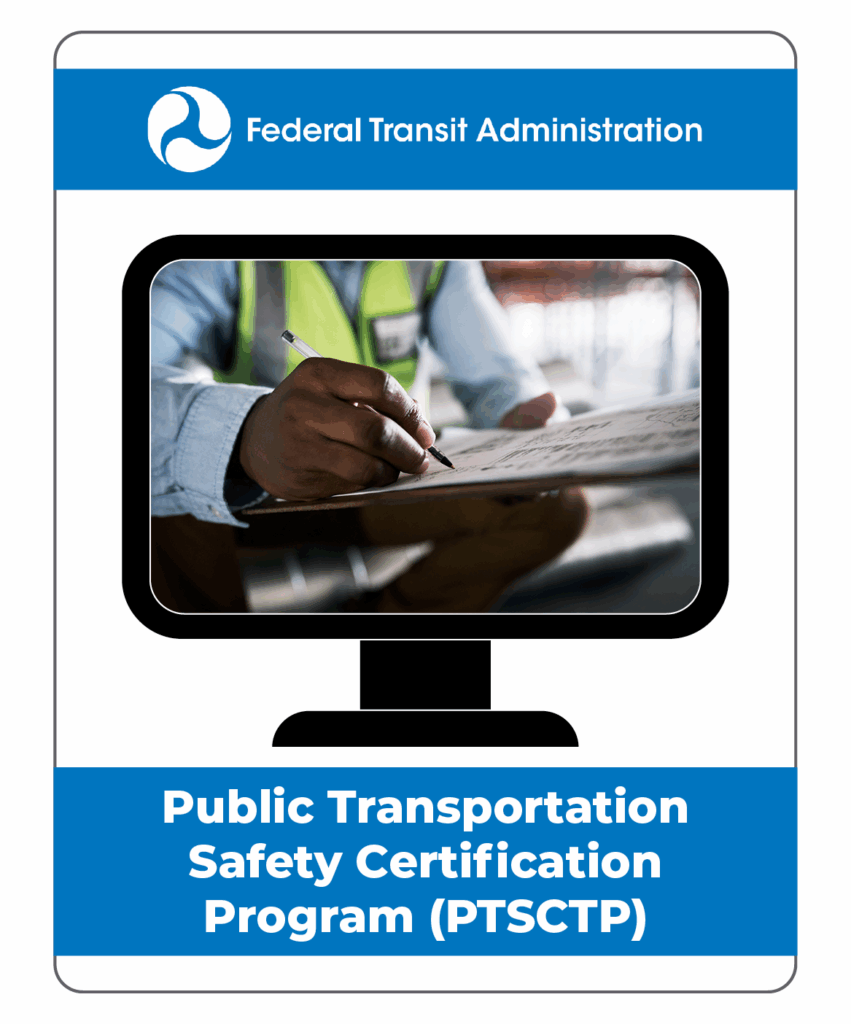
Public Transportation Safety Certification Program (PTSCTP)
U.S. Department of Transportation
February 2025
TOPICS: Safety and Health , Training
The Public Transportation Safety Certification Program, provided by the Transportation Safety Institute (TSI) and supported by the Federal Transit Administration (FTA), covers the minimum requirements to enhance the technical proficiency of safety personnel who work in the rail transit industry. Two groups are required to complete the PTSCTP training:
- State Safety Oversight Agency personnel and contractors who conduct safety audits and examinations of rail transit systems
- Rail transit agency personnel and contractors who are directly responsible for safety oversight
Bus transit agency personnel and contractors who are directly responsible for safety oversight are not required but encouraged to participate in PTSCTP.
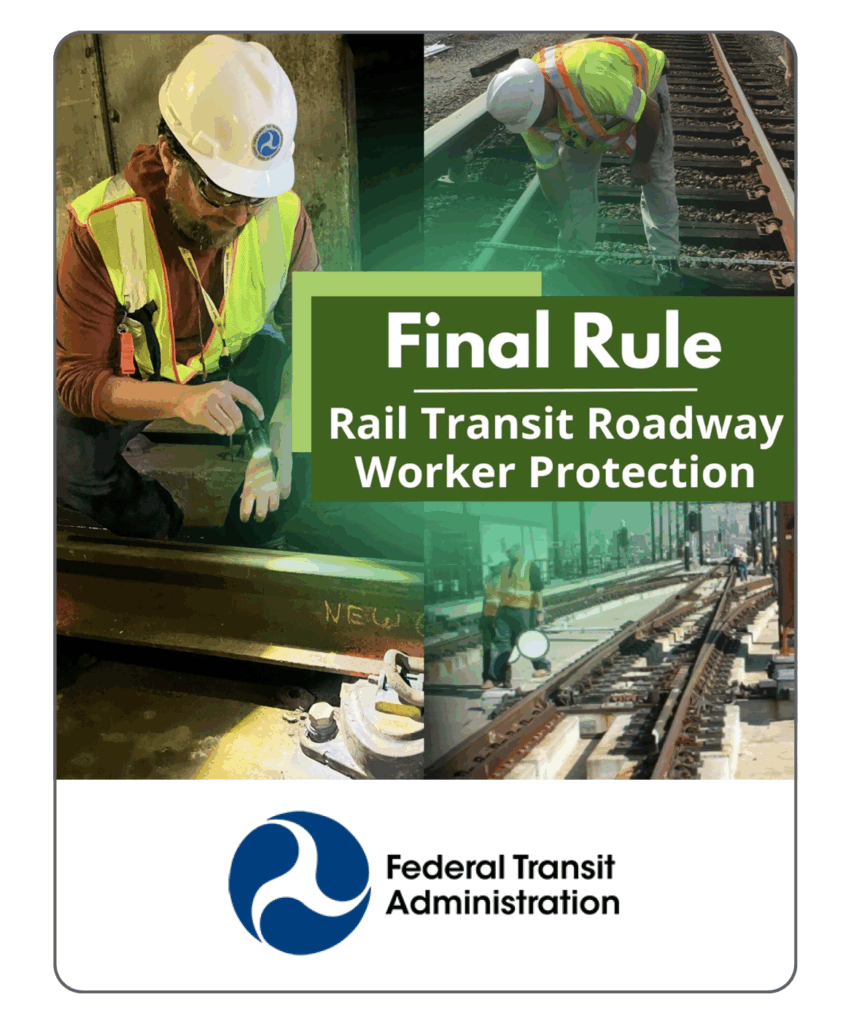
Rail Transit Roadway Worker Protection
The Rail Transit Roadway Worker Protection (RWP) regulation establishes minimum standards to ensure the safe operation of public transportation systems and prevent injuries and fatalities for transit workers. Rail transit agencies nationwide are required to create programs and processes that focus on safety for workers who work on or near the rails in an area known as the track roadway. This page explains the regulation, answers frequently answered questions, and provides additional resources.
Federal Transit Administration
January 2025
TOPICS: Policy and Planning , Safety and Health , Training
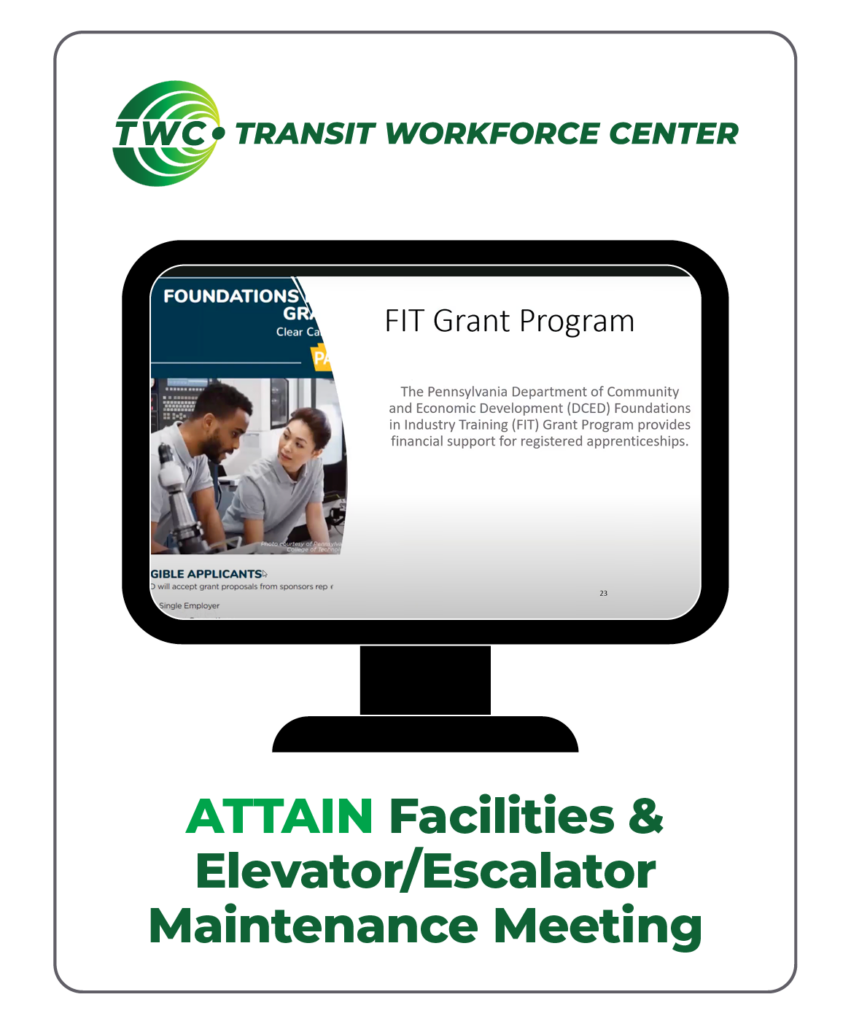
ATTAIN Facilities & Elevator/Escalator Maintenance Meeting
Transit Workforce Center
September 2024
The American Transit Training and Apprenticeship Innovators Network (ATTAIN) is a peer network created for transit agencies and labor unions to explore new apprenticeship programs or enhance existing programs for their frontline workforce. Through ATTAIN, TWC promotes apprenticeship, advances frontline worker training, facilitates peer exchange, and provides technical assistance to agencies and unions interested in developing apprenticeship programs for their frontline workforce.
This ATTAIN meeting featured discussions from Pittsburgh Regional Transit/ATU 85 and Bay Area Rapid Transit about how their facilities and elevator/escalator maintenance apprenticeship programs are developed, work, and the benefits they offer.
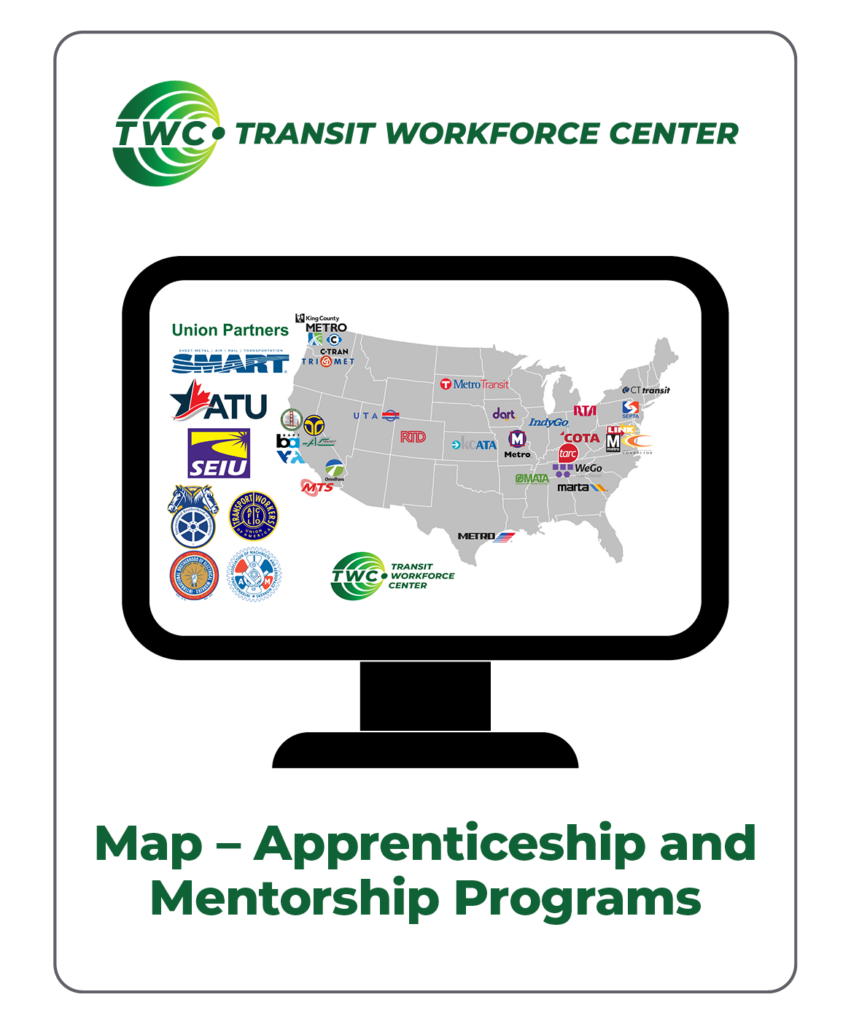
Map – Apprenticeship and Mentorship Programs
Visualizing the Growing Trend of Registered Apprenticeship in U.S. Transit Agencies
Over the past 10 years, the U.S. Department of Labor (DOL) and other federal agencies have invested heavily in promoting and supporting registered apprenticeship, resulting in a significant expansion of registered apprentice programs across the country. Likewise, the use of registered apprenticeship for frontline public transit occupations has increased significantly, with many transit agencies and their corresponding unions jointly adopting labor-management standards that create a framework for apprenticeship. Only five transit agencies had a registered apprenticeship program in 2013, compared with 30 transit agencies in 2023.
This map displays transit locations with registered apprenticeship or mentorship programs. Users can reveal information about the active apprenticeship/mentorship programs at each agency, the agency’s workforce-related statistics (such as wage, employee count, labor hours, and ridership), and links to Standards of Apprenticeship, which include details about qualifications, wages, hours, and training schedules.
Transit Workforce Center
September 2024
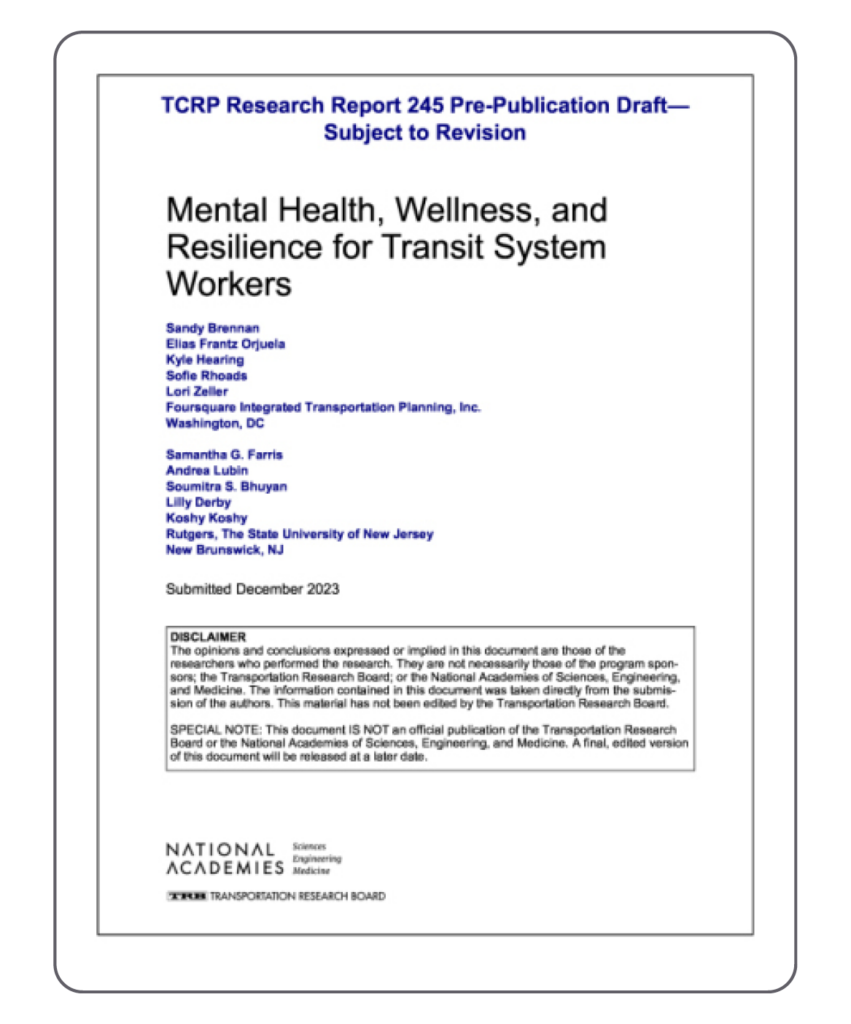
Mental Health, Wellness, and Resilience for Transit System Workers
TCRP Research Report 245: Mental Health, Wellness, and Resilience for Transit System Workers provides a detailed summary of common factors that influence the mental health, well-being, and resiliency of frontline transit workers and includes a range of solutions that transit agencies can implement to address them. Findings were determined using a mix of research methods, including multiple interviews and focus groups with frontline employees, transit agency management, and union leadership at two different points in the project.
Transit Cooperative Research Program
February 2024
TOPICS: Policy and Planning , Safety and Health
Contributor(s): Sandy Brennan, Elias Frantz Orjuela, Kyle Hearing, Sofie Rhoads, Lori Zeller, Samantha G. Farris, Andrea Lubin, Soumitra S. Bhuyan, Lilly Derby, Koshy Koshy; Transit Cooperative Research Program; Transportation Research Board; National Academies of Sciences, Engineering, and Medicine
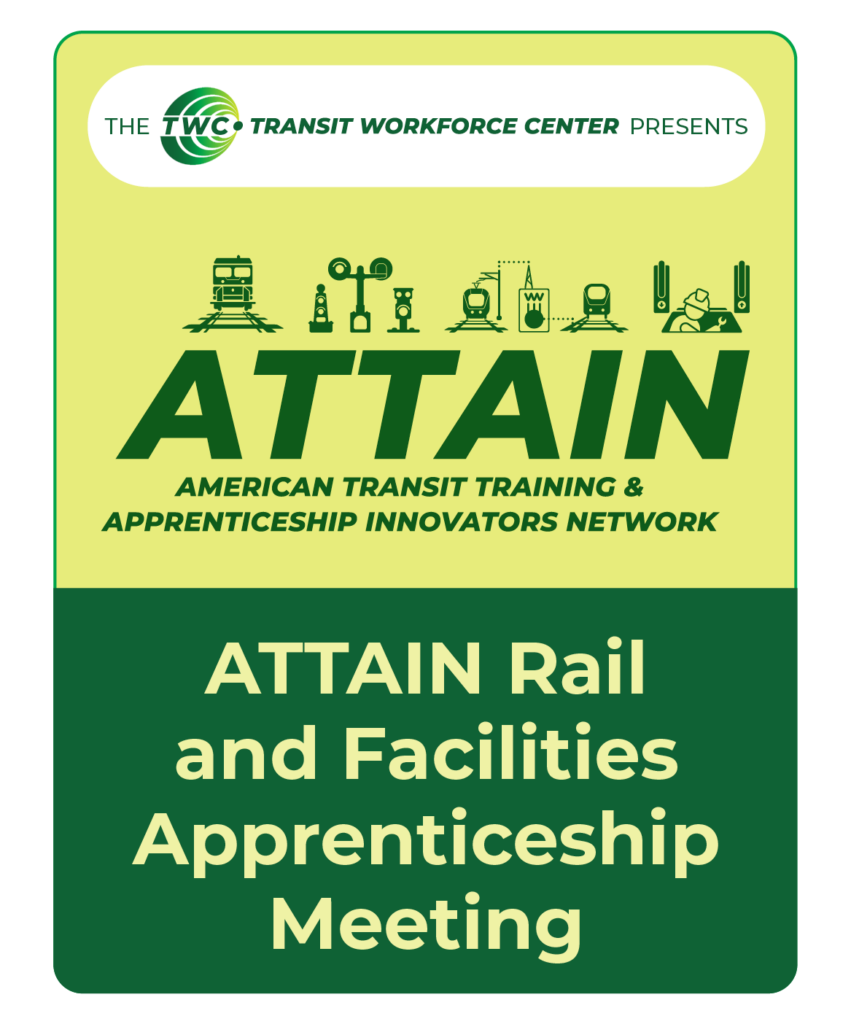
ATTAIN Rail and Facilities Apprenticeship Meeting
This recorded meeting of the ATTAIN Rail and Facilities Committee serves as a resource for transit industry stakeholders and includes presentations on apprenticeship and case studies of successful programs across the country.
Transit Workforce Center
September 2023
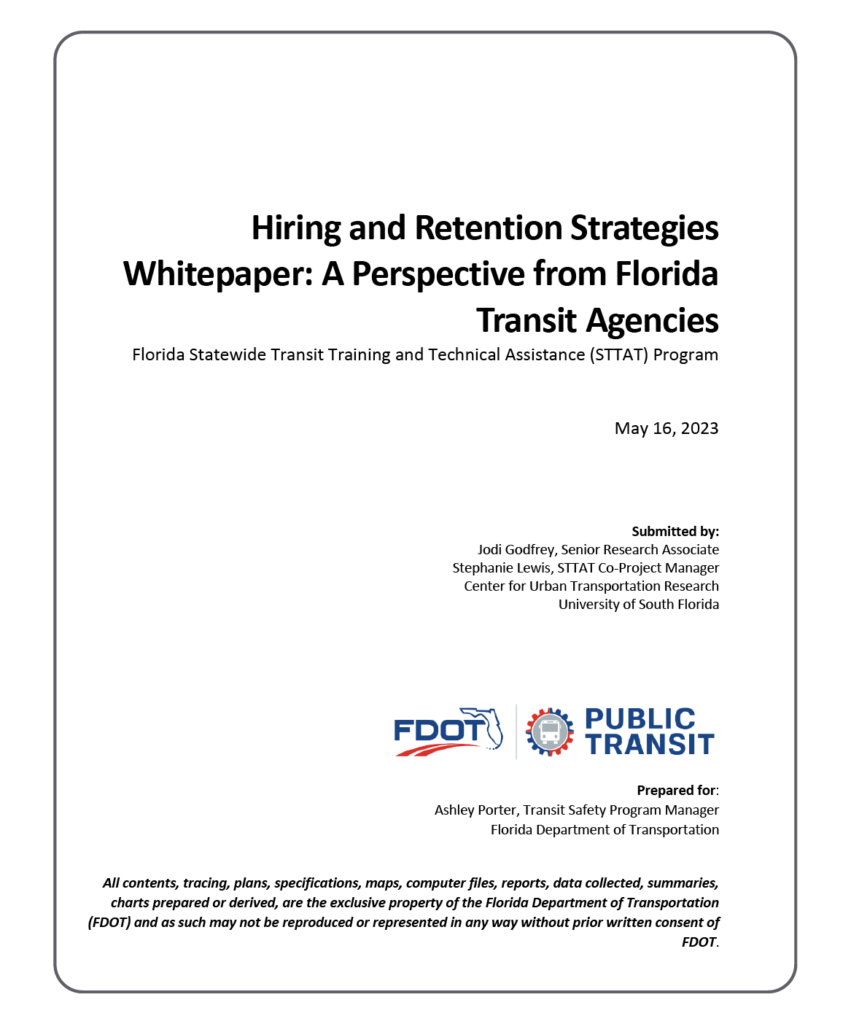
Hiring and Retention Strategies Whitepaper: A Perspective from Florida Transit Agencies
This study examines what transit agencies are doing to address hiring and retention challenges, what strategies are working, and what problems still need to be solved. The report includes six case study sites from Florida transit agencies and one non-Florida transit agency, that were selected due to a variety of characteristics, including partnerships and implemented service changes.
Center for Urban Transportation Research
June 2023
TOPICS: Hiring and Recruitment , Policy and Planning , Retention
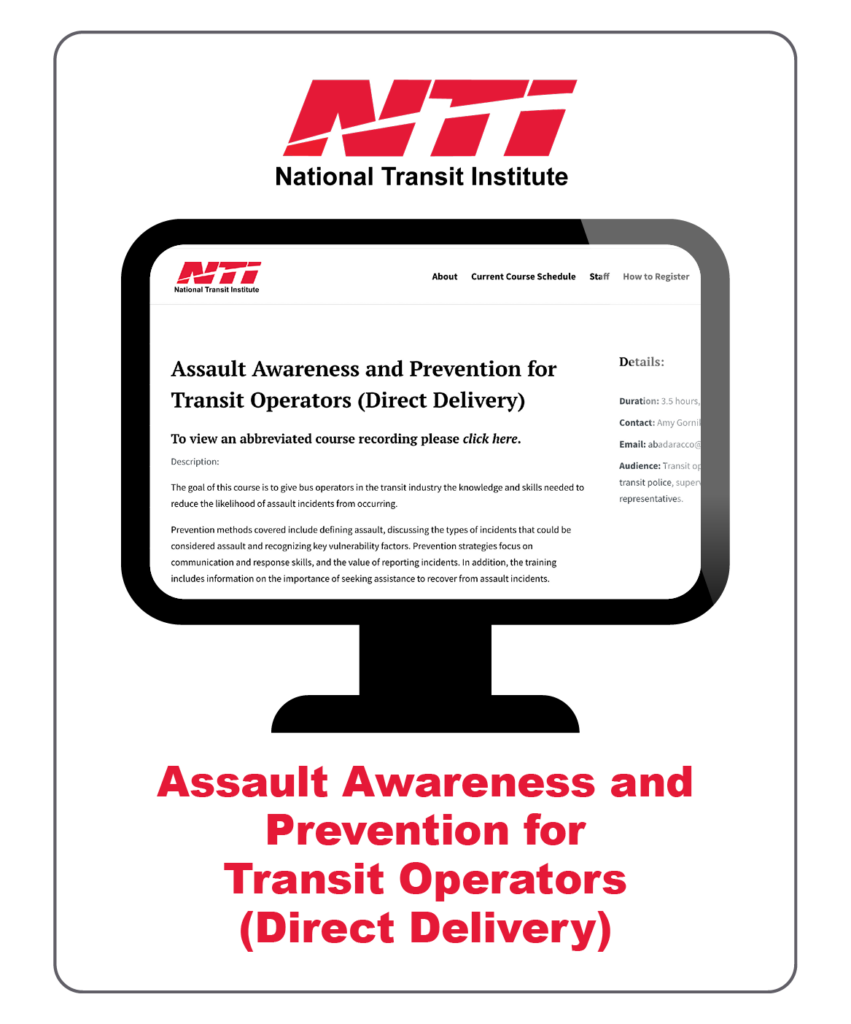
Assault Awareness and Prevention for Transit Operators (Direct Delivery)
This course provides transit bus operators with knowledge and skills to reduce the likelihood of assault incidents, including defining assault and types of incidents that could be considered assault, covering prevention strategies such as communication and response skills, and emphasizing the importance of reporting assault incidents and seeking recovery assistance.
National Transit Institute
TOPICS: Safety and Health , Training
You can register for the course with the Rutgers University Noncredit Course Catalog & Registration System.
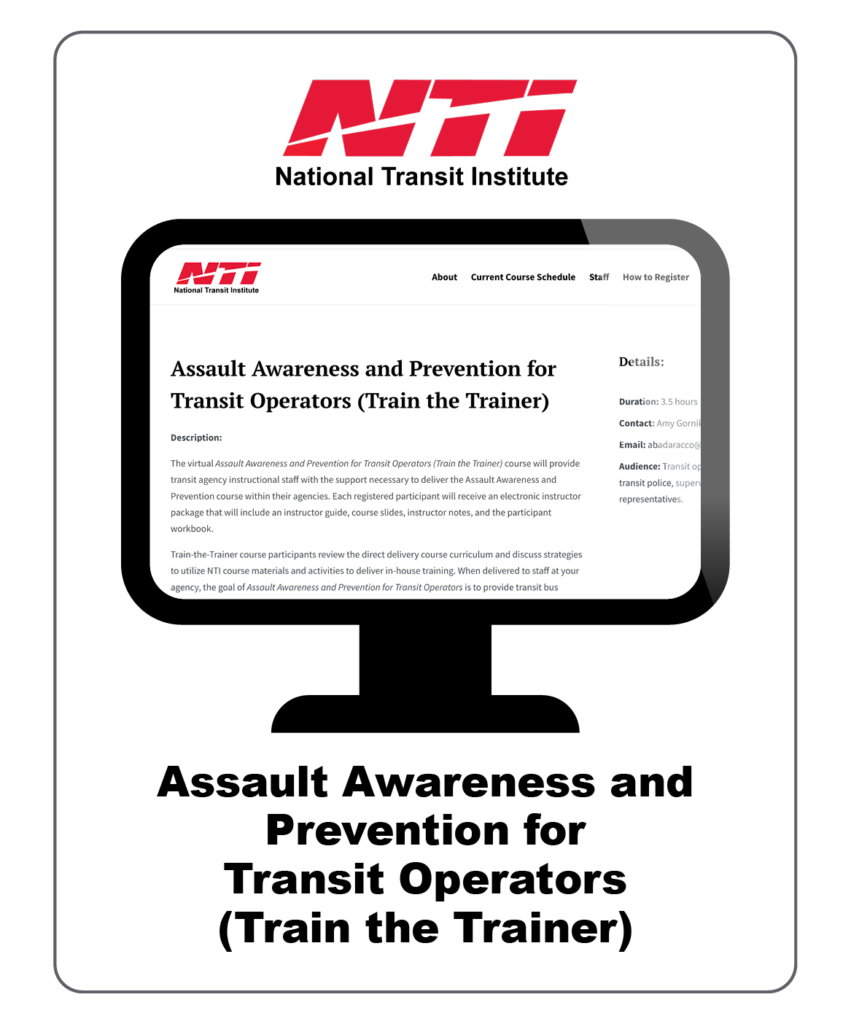
Assault Awareness and Prevention for Transit Operators (Train the Trainer)
This virtual course will provide transit agency instructional staff with the support necessary to deliver the Assault Awareness and Prevention course within their agencies. Each registered participant will receive an electronic instructor package that will include an instructor guide, course slides, instructor notes, and the participant workbook. Participants will be able to deliver the training to provide transit bus operators with knowledge and skills to reduce the likelihood of assault incidents.
National Transit Institute
January 2023
You can register for the course with the Rutgers University Noncredit Course Catalog & Registration System. The direct delivery course for operators can be found here.
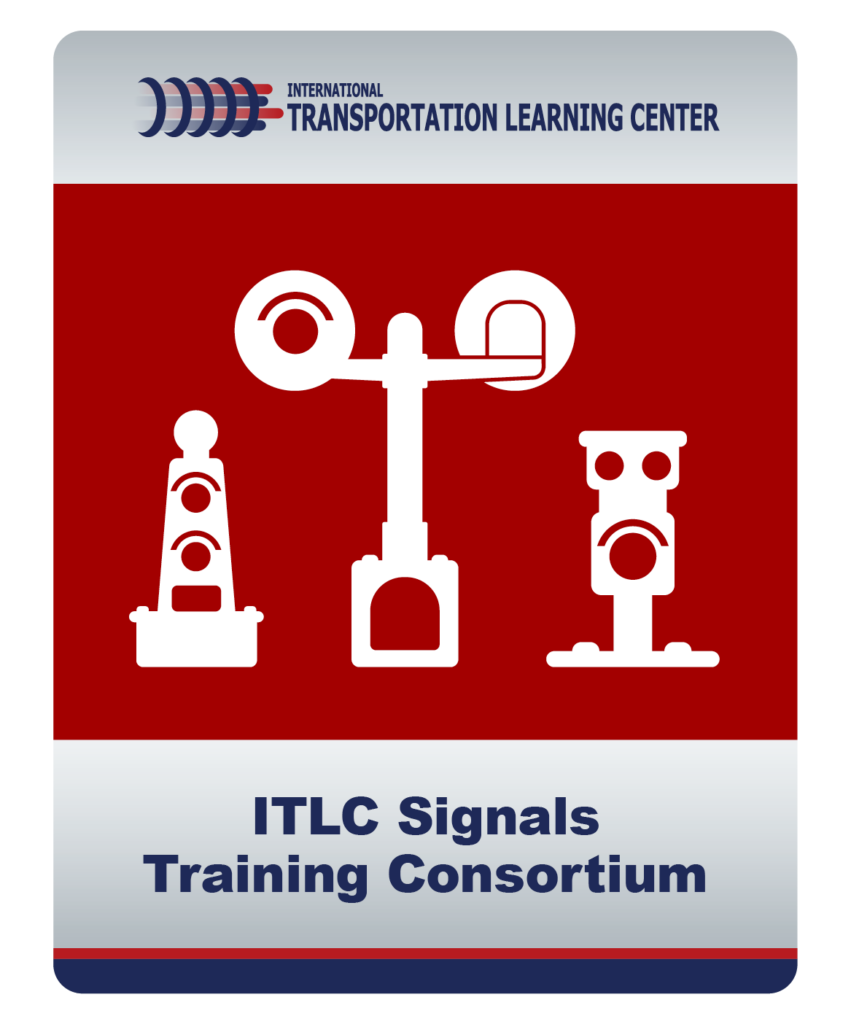
ITLC Signals Training Consortium
The International Transportation Learning Center (ITLC) organizes multiple national training consortia to develop standards-based national training courseware for frontline occupations in public transportation organizations.
In 2013, public transportation agencies and unions across the country came together to form the National Signals Maintenance Training Consortium. They were driven to create a full set of standardized national courseware to support training and apprenticeship programs for signal maintainers. Since then, over 70 signals maintenance subject matter experts from 26 member agencies and unions have worked with instructional systems designers from the ITLC to create a comprehensive training program for signal maintainers.
International Transportation Learning Center
November 2022
TOPICS: Safety and Health , Training
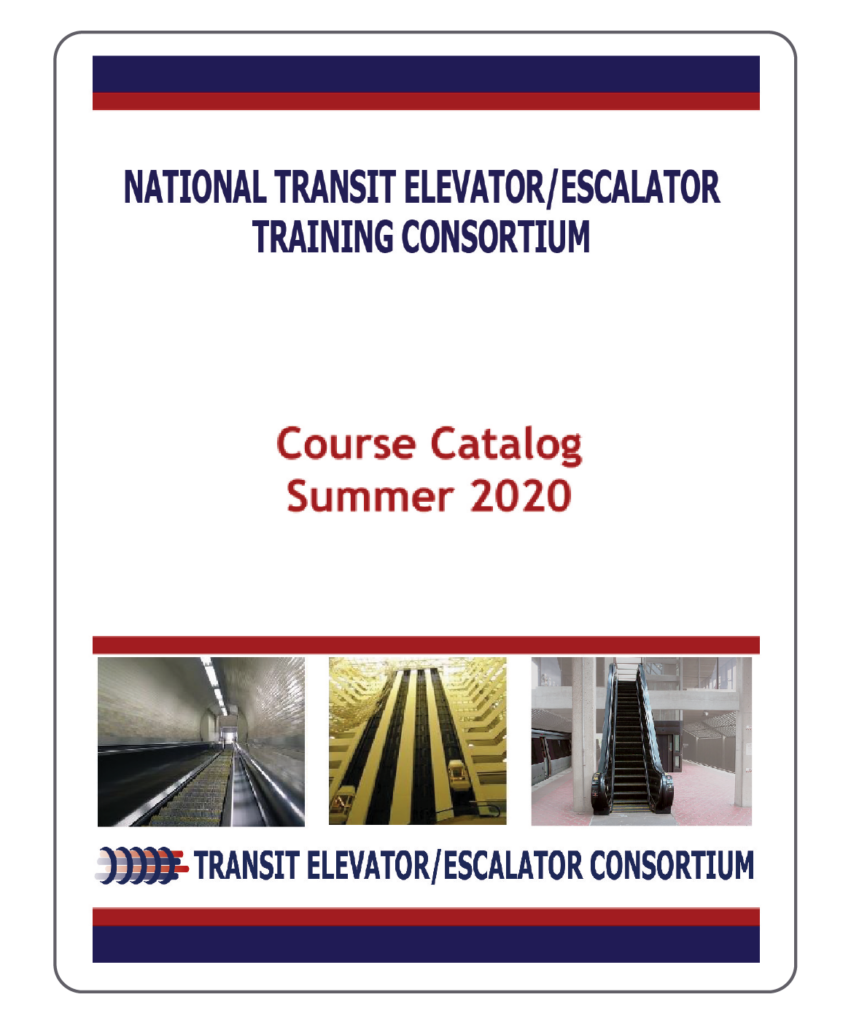
Elevator/Escalator Training Consortium
International Transportation Learning Center
The International Transportation Learning Center (ITLC) organizes multiple national training consortia to develop standards-based national training courseware for frontline occupations in public transportation organizations.
The Transit Elevator-Escalator Training Consortium (the Consortium) was the first in an ongoing series of industry-wide collaborative programs to develop integrated systems of training for key frontline occupations in public transportation. Building on national training standards developed by industry Subject Matter Experts (SMEs) from 2006 to 2010 and then adopted by the American Public Transportation Association (APTA), the Consortium developed a full set of standardized national courseware to support training and apprenticeship programs for transit elevator/escalator (El-Es) technicians. The curriculum and courseware development team was composed of subject matter experts (SMEs) from five member agencies and unions from across the country. Membership of the Consortium consists of transit systems that maintain their vertical transportation equipment in-house, rather than relying on outside contractors. Equipment manufacturers contributed access to their technical drawings and manuals to enrich the courseware.
The list of courseware as of Summer 2020 is contained in the attached catalog.
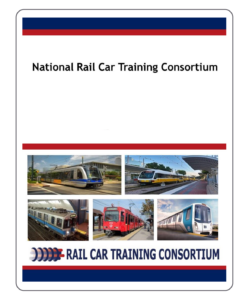
ITLC Rail Car Training Consortium
The International Transportation Learning Center (ITLC) organizes multiple national training consortia to develop standards-based national training courseware for frontline occupations in public transportation organizations.
Started in late 2015, the National Rail Car Training Consortium has moved forward with its mission to create standardized national training courseware for rail car technicians. The development team composed of over 40 rail car maintenance subject matter experts (SMEs) from 18 member agencies and unions from across the country, along with instructional systems designers from the ITLC, design curriculum and courseware for the rail and transit industry.
The attached catalog contains a summary of Consortium courseware.
International Transportation Learning Center
July 2020
TOPICS: Safety and Health , Training
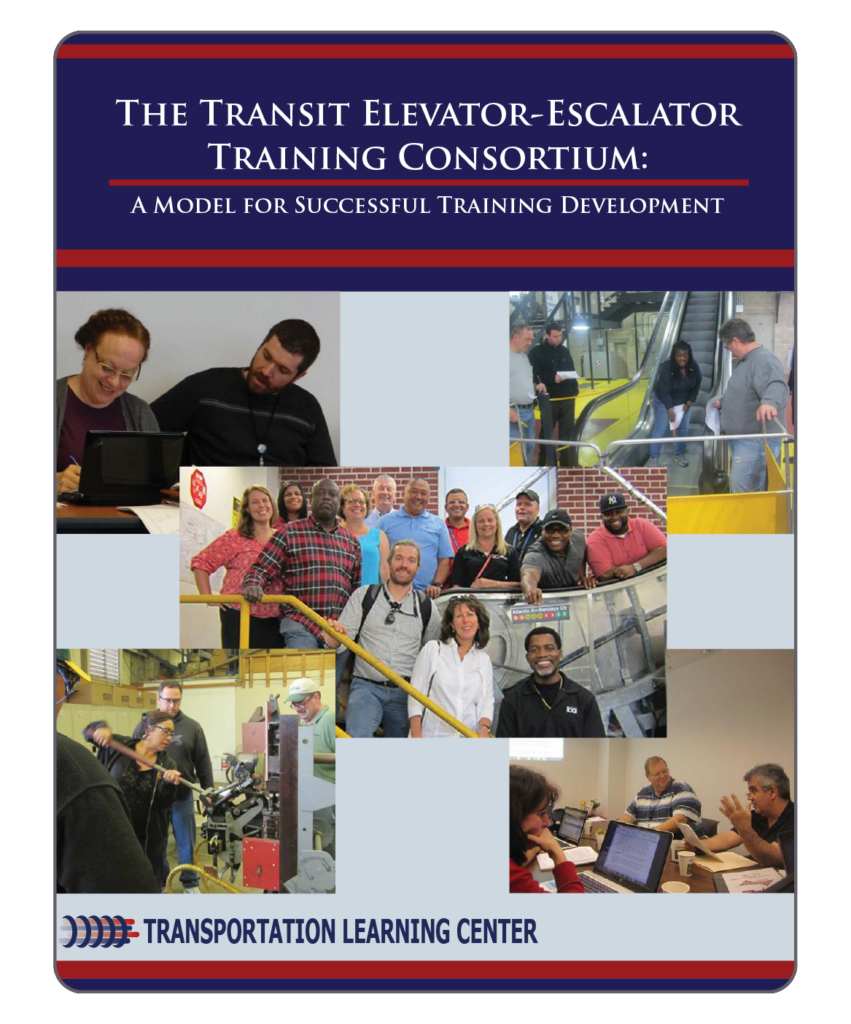
The Transit Elevator-Escalator Training Consortium: A Model for Successful Training Development
A report on the process, products and outcomes related to the first National consortium for development of training for public transportation maintenance employees. This joint labor-management effort set a proven model for multiple other similar consortia. Products include – instruction ready courseware, a nationally recognized apprenticeship program for transit maintenance elevator/escalator maintainers and train-the-trainer program.
International Transportation Learning Center
September 2016
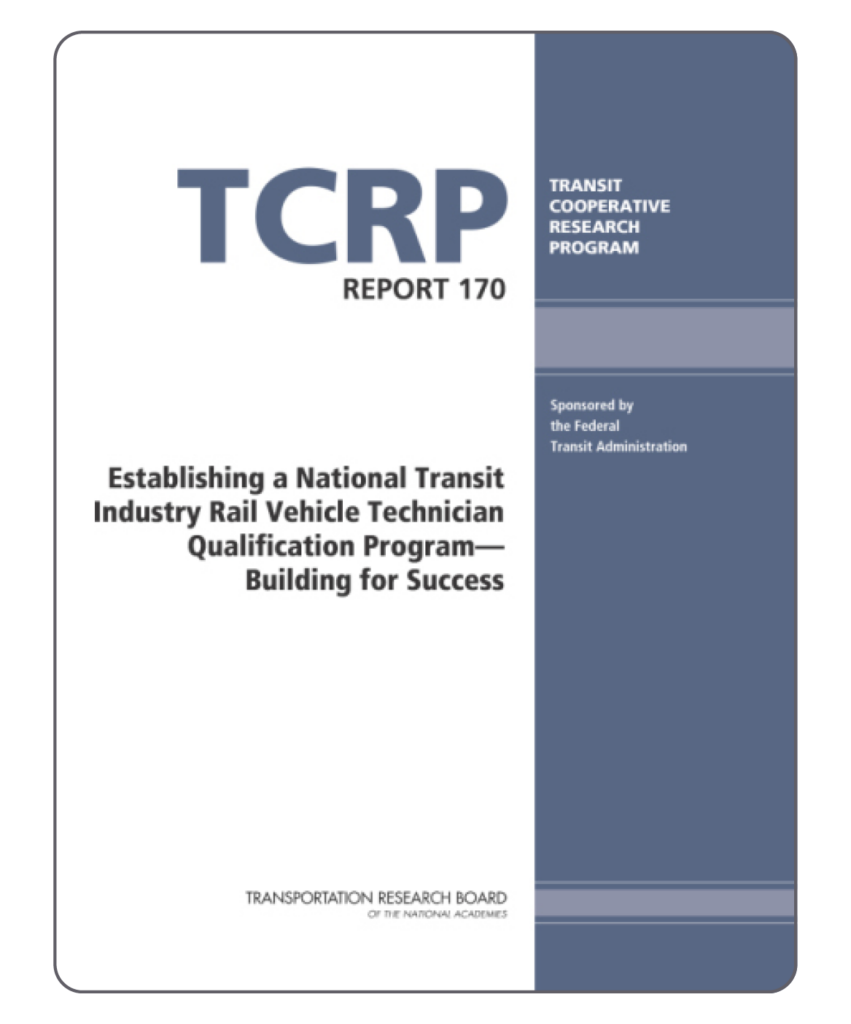
Establishing a National Transit Industry Rail Vehicle Technician Qualification Program—Building for Success
TRB’s Transit Cooperative Research Program (TCRP) Report 170: Establishing a National Transit Industry Rail Vehicle Technician Qualification Program—Building for Success describes a system of qualification that has been developed for rail vehicle technicians. This qualification system is available for implementation through the Transportation Learning Center.
The program integrates national training standards, progressive classroom curricula and introductory courseware, on-the-job learning modules, an apprenticeship framework that combines well-designed sequences of learning, mentoring to support learners, and coordination of classroom and on-the-job learning. The qualification system also includes written and hands-on certification assessments to confirm that technicians have the practical knowledge and skills required to perform their jobs at the highest level of expertise.
Transit Cooperative Research Program (TCRP) & International Transportation Learning Center
January 2014
TOPICS: Career Pathways , Mentorship , Trainer and Mentor Development , Training
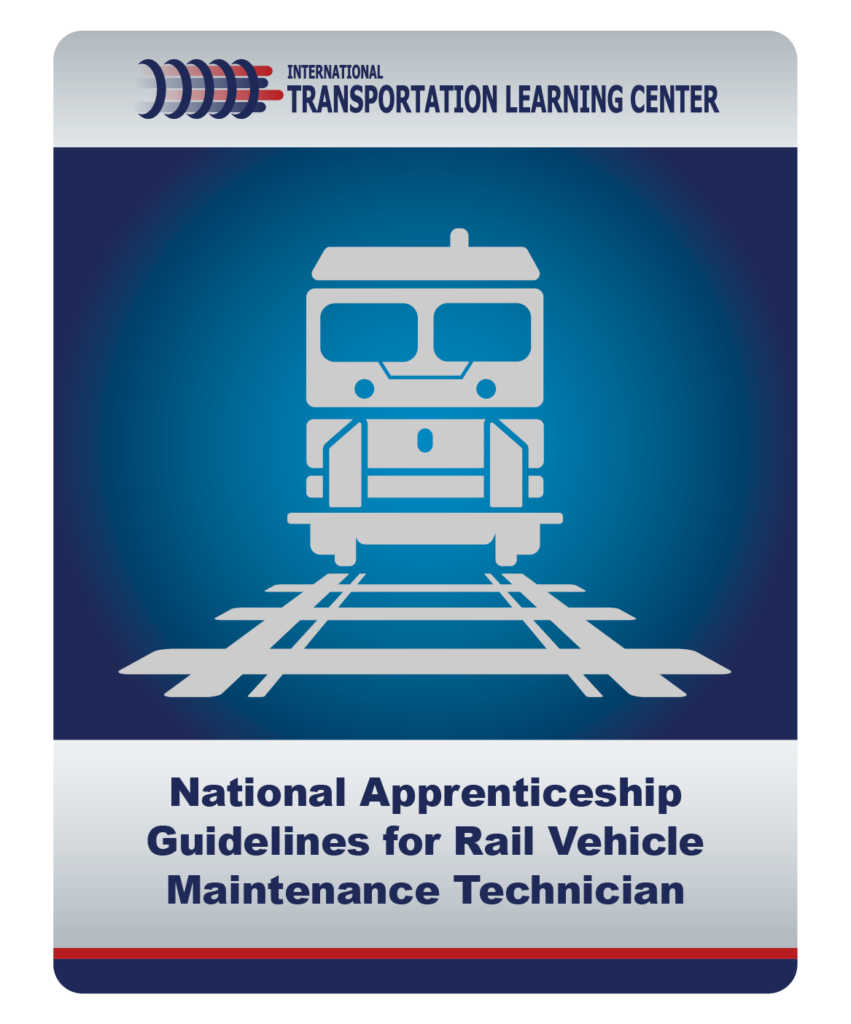
National Apprenticeship Guidelines for Rail Vehicle Maintenance Technicians
The purpose of these National Guidelines for Apprenticeship Standards (National Guideline Standards) is to provide policy and guidance to local Sponsors in developing Standards for Apprenticeship for local approval and registration. These National Guideline Standards developed by the Sponsor are certified by the U. S. Department of Labor, Office of Apprenticeship as substantially conforming to the requirements of Title 29, CFR parts 29 and 30. State Apprenticeship Agencies recognized by the Office of Apprenticeship to register local programs, and/or local laws and regulations, may impose additional requirements that must be addressed in the local apprenticeship standards.
International Transportation Learning Center; National Rail Car Training Committee
June 2013
TOPICS: Apprenticeship , Training
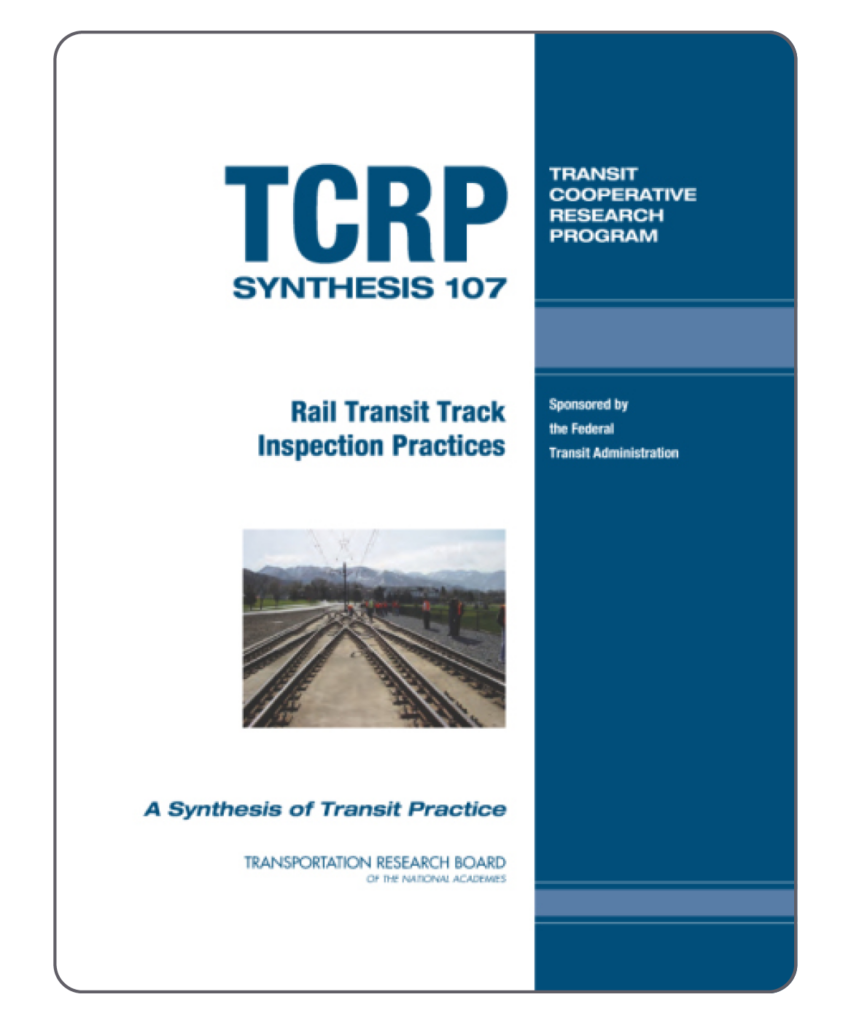
Rail Transit Track Inspection Practices
TRBs Transit Cooperative Research Program (TCRP) Synthesis 107: Rail Transit Track Inspection Practices offers information across a range of older and newer U.S. rail transit agencies on track inspection practices and policies.
Issues addressed in the report include agency staffing, agency organization and characteristics, track inspection program criteria, training and certification, procurement, and track safety practices.
Transit Cooperative Research Program (TCRP)
January 2013
TOPICS: Policy and Planning , Procurement , Safety and Health , Training
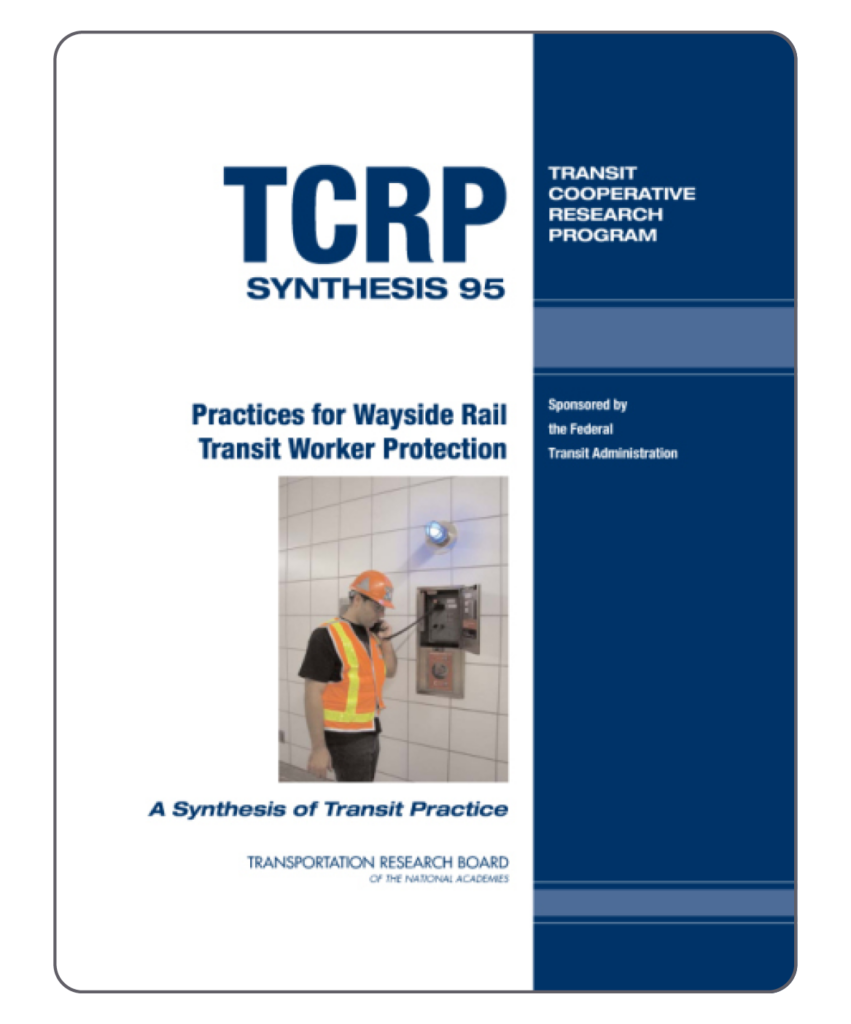
Practices for Wayside Rail Transit Worker Protection
TRB’s Transit Cooperative Research Program (TCRP) Synthesis 95: Practices for Wayside Rail Transit Worker Protection is designed to highlight knowledge, practice, lessons learned, and gaps in information related to wayside rail transit worker protection programs.
Transit Cooperative Research Program (TCRP)
January 2012
TOPICS: Safety and Health , Training
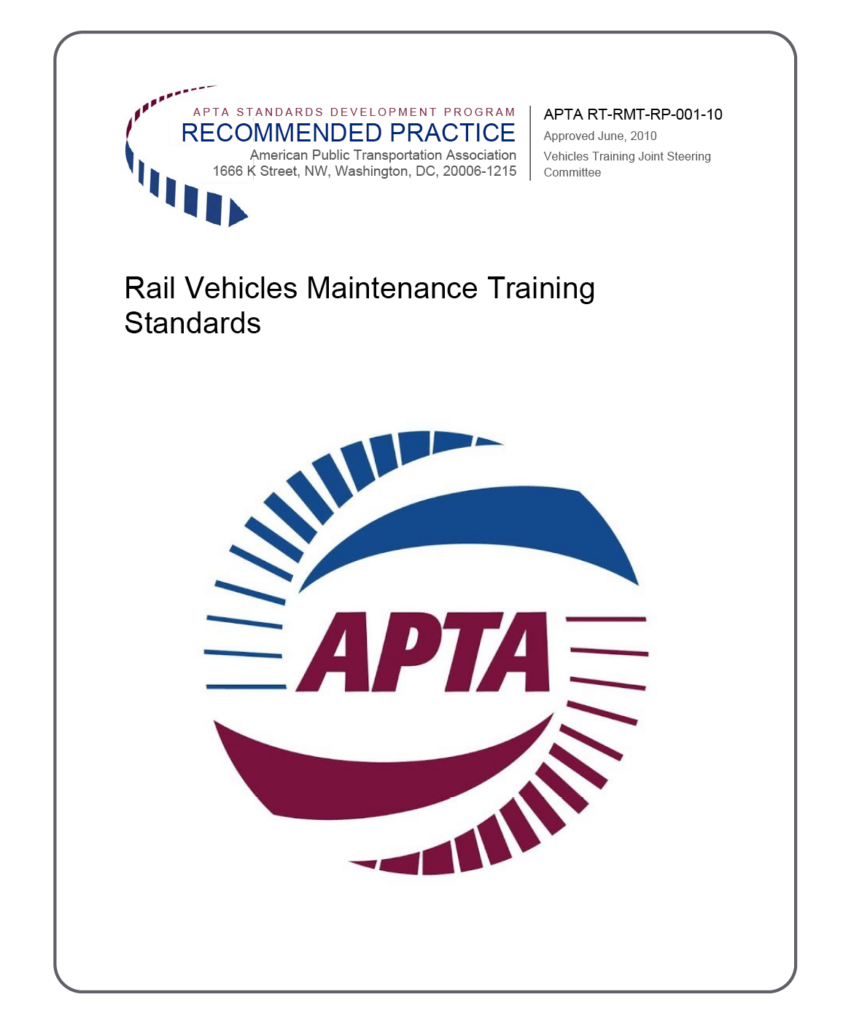
Rail Vehicles Maintenance Training Standards
In response to the transit industry’s need for rail vehicles maintenance training, the Transportation Learning Center partnered with APTA, transit agencies and unions representing transit workers to develop these joint labor-management training guidelines and recommended training practices.
American Public Transportation Association (APTA) & International Transportation Learning Center
June 2010
TOPICS: Policy and Planning , Training
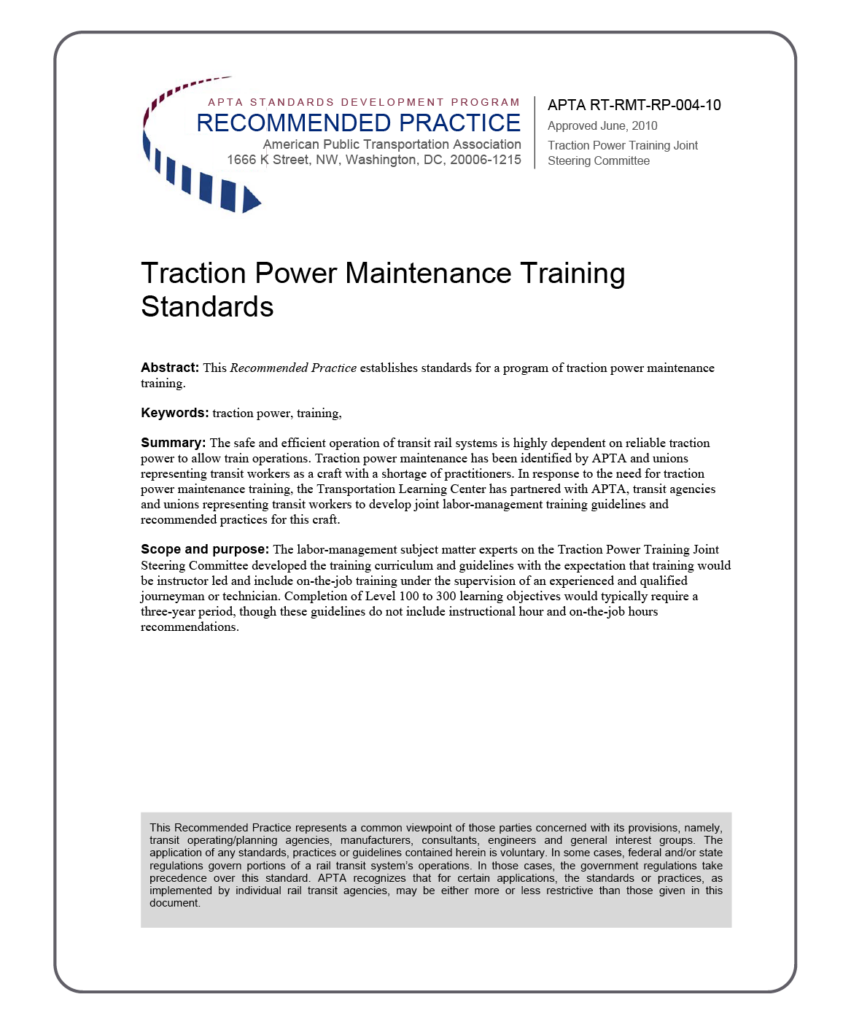
Traction Power Maintenance Training Standards
This Recommended Practice establishes standards for a program of traction power maintenance training.
American Public Transportation Association
June 2010
TOPICS: Training
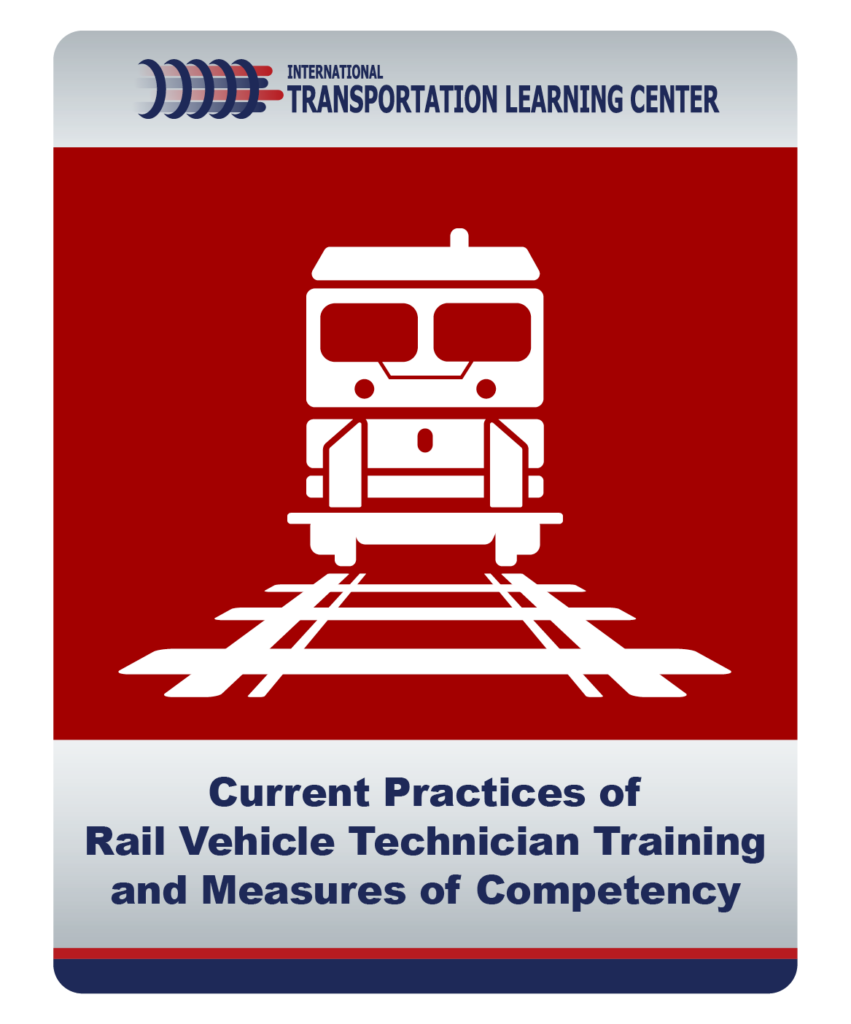
Current Practices of Rail Vehicle Technician Training and Measures of Competency
This 2009 ILTC brief summarizes findings from a survey on best practices in rail car maintenance, based on recommendations from the RCRP E-7 Panel.
International Transportation Learning Center
January 2009
TOPICS: Policy and Planning , Training
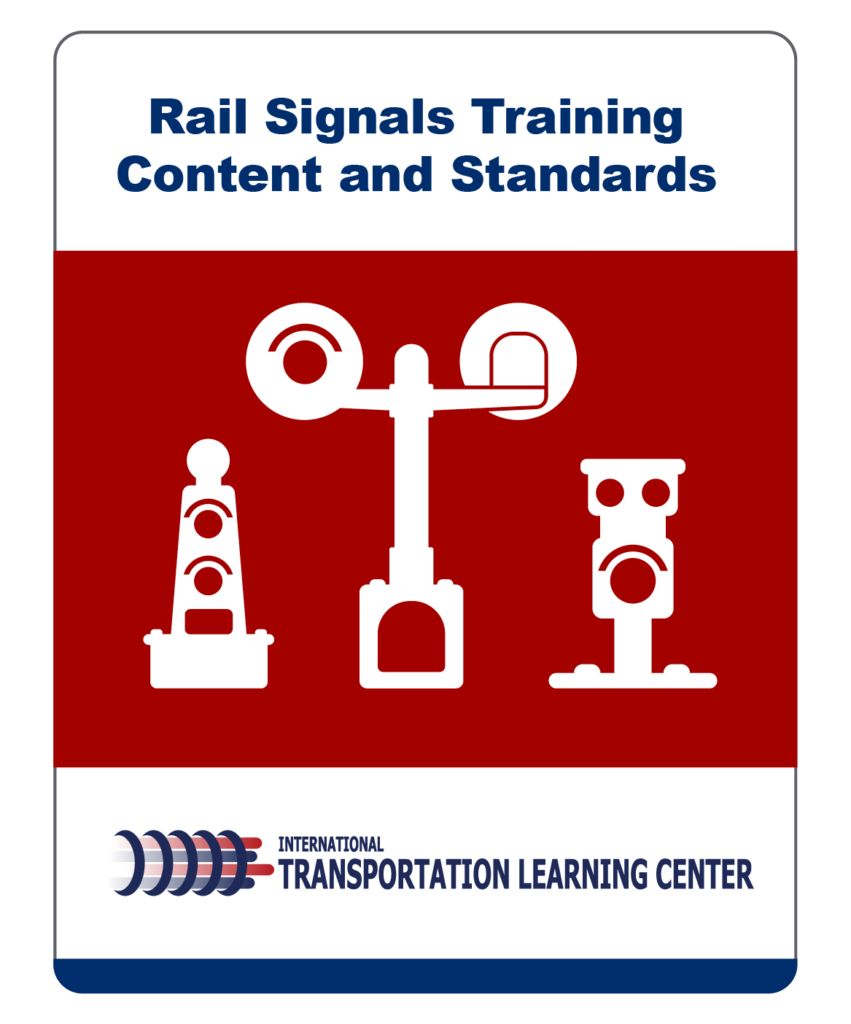
Rail Signals Training Content and Standards
An overview of ITLC’s signals training course (2 modules—level 100 and 200).
International Transportation Learning Center
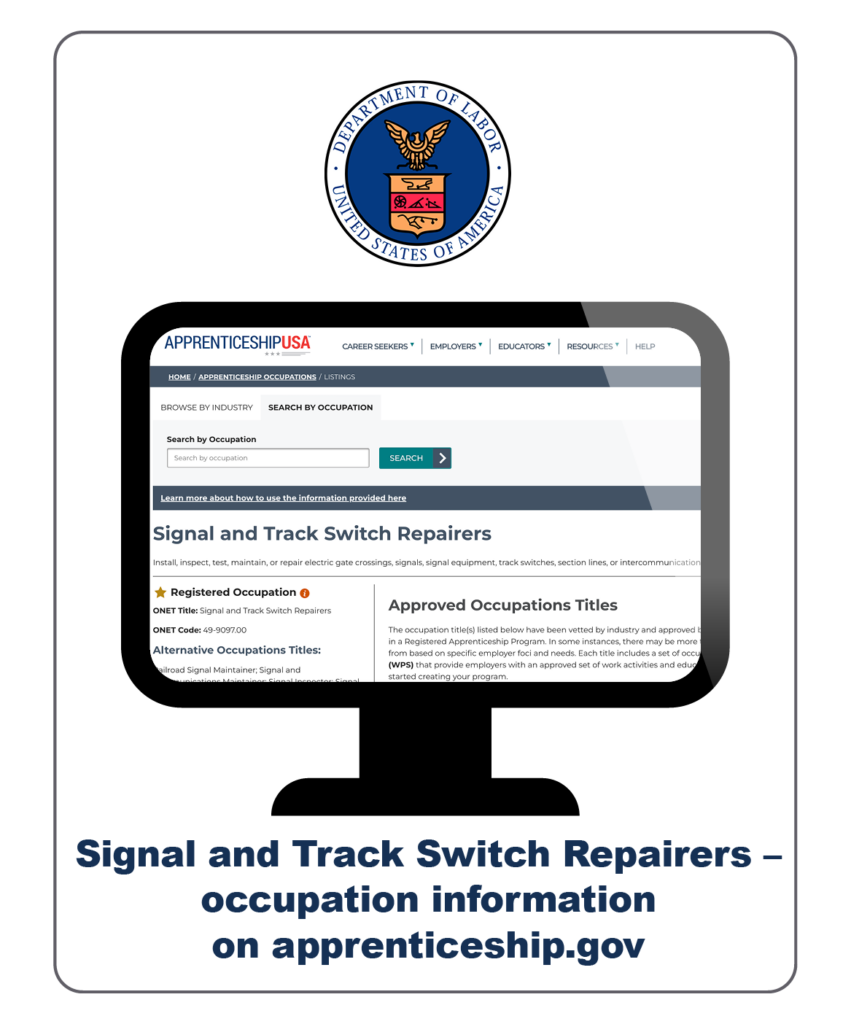
Signal and Track Switch Repairers
This search page on Apprenticeship.gov provides results for approved occupation titles under Signal and Track Switch Repairers, as well as work activities, education, and related occupations.
US Department of Labor
TOPICS: Apprenticeship , Career Pathways







